
The participants of the session discussed the definitions of indirect costs and the validity of the analysis of the so-called the total cost of disease, which is essential for a holistic health care effectiveness assessment. They pointed out the components of indirect costs, such as absenteeism and presenteeism of patients and their relatives, as well as the costs of premature deaths – that is, those that occur before the patient reaches retirement age. The components also include the costs of temporary and indefinite inability to work.
Beata Ambroziewicz, representing All.can Poland, confirmed that indirect costs have been the area of interest of patient organizations for several years now. Including these costs in health policy has become one of the priorities of the international All.Can initiative, in which Poland also participates. The challenges posed by demographic changes and the aging of the society, the increase in the incidence of oncological diseases and the resources needed for treatment necessitate a more comprehensive, holistic view of the issue of health expenditure. Unfortunately, when we are still thinking about financing the treatment, we are still looking at the NHF budget, but it is time to change the perspective. She asked the question when new solutions would be possible, for example those related to combining the budgets of institutions burdened with the costs of diseases in the broader meaning of this term. Beata Ambroziewicz also mentioned the report on the optimization of the patient’s path in the system, prepared under the All.Can initiative, which will contain proposals favoring better allocation of funds.
Session participants agreed that an increase in health expenditure is a necessity, especially in those areas where it may increase productivity.